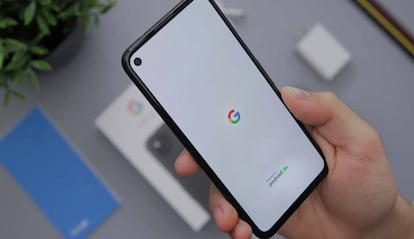Is the age of ‘googling’ over? How generative AI chatbots are being used as search engines
The emergence of ChatGPT and other conversational programs is changing the way queries are made on the internet

Since its launch in November 2023, people have not stopped talking about ChatGPT, and not only because of its overwhelming ability to maintain fluid conversations with users. One of the most frequently asked questions that arose after its arrival was how the OpenAI chatbot — and those that other companies were perfecting in the following months — was going to change the way we search and ask questions on the internet. In other words, was Google Search, which until now had an almost total monopoly on web searches, going to be replaced?
In Spain, it is the most popular search engine by far: 96% of users ask Google, and the figure is 91% globally. Despite having been the only tool for decades — so much so that in common language it has become its own verb “to Google” — in recent times users have begun to question its effectiveness.
One of the reasons is the amount of sponsored content, spam, or low-quality websites driven by search engine optimization techniques. These, however, have undermined Google’s credibility, according to a recent study by German researchers. In this scenario, it is not surprising that users are starting to test several alternatives that are already on the market. This includes Gemini, the artificial intelligence (AI) model that has replaced Bard, the chatbot that Google hastily launched to compete with ChatGPT. Some generation Z users have even started looking for answers on TikTok. So what chances does Google actually have of being replaced? Do AI chatbots work as well as search engines?
Search engines with AI
Those who want to remain loyal to Google will find its natural heir in Gemini — even though the company insists on saying that the two tools are independent and respond to two different needs. The official replacement for Bard since the beginning of February, the model has a website and an application (although the latter is not yet available in European Union countries). The chatbot can be used for all the searches that were normally intended for Google Search: from the meaning of a word, to the weather in a city, to current events, and food recipes.
Microsoft's Bing also allows advanced searches thanks to the implementation of ChatGPT. The tool, which was first introduced under the name Bing Chat and has since been renamed Copilot, can be accessed from the Microsoft Edge browser by selecting the AI plugin icon in the toolbar.
A probably less well-known option that is gaining recognition is Preplexity. It is a one-year-old startup that was created by engineers who worked on artificial intelligence research at OpenAI and Meta. Specialists in the field speak highly of this tool online, which has even received funding from the president and founder of Amazon, Jeff Bezos. Thanks to the results it offers, its interface, and the ability to cite sources — if you ask a question about a current event, in addition to providing a written response, it allows you to click on news from online newspapers — it is probably the one that most resembles Google Search.
https://t.co/5lHQAVzZhb and its app have definitely replaced my google usage for now. It’s pretty incredible.
— tobi lutke (@tobi) December 28, 2023
Like Google Search, these services can be used with free versions that work well, although there are some limitations, such as the number of queries that can be made, or freezing if the traffic volume is too high. To get rid of these restrictions, users can choose to subscribe. Gemini, Copilot, and Perplexity have launched premium programs for $20 per month (the same price as ChatGPT 4, the most advanced version of OpenAI’s chatbot).
How to use AI chatbots
Instead of typing a series of keywords, as we do on Google, queries in AI search engines are more useful if they are asked as a question, especially when they begin with the formulas “what is” or “how to.” Perplexity advises using natural, everyday language, and allows access to popular queries — normally linked to current news — that other users have made, through its “Discover” tool. Like ChatGPT, these search engines allow you to ask again or refine the search if the answer provided is not sufficient. Copilot also offers the opportunity to choose between three different conversation styles: more creative, more balanced, or more precise.
The biggest difference with respect to Google Search is that while the results of the latter are a list of links to different web pages — including sponsored content, which is creating a lot of commotion and confusion lately — AI chatbots provide a single response in the form of a summary of all the information they have been able to collect. However, this aspect is probably also the most problematic, as it raises doubts about the veracity of the information. In order to work, these artificial intelligence platforms analyze extensive groups of data collected from the internet, so-called large linguistic models, or LLM, and subsequently apply algorithms to produce logical answers, although not all of them explain the process by which they reached these conclusions.
Furthermore, even when they provide the source of the information — a tool present only on the paid version — these are usually random. When asked about the “Koldo affair,” in which a former Spanish minister was implicated in a corruption scandal over the purchase and sale of masks during the Covid pandemic, ChatGPT answered with three paragraphs of 250 words that have been written using two articles from two different newspapers, which are very distant in their editorial line. If you refresh the answer, the second result turns out to be broader and uses more sources (up to four different newspapers).
In contrast, Gemini provides a summary with key information on the case and an update on the day of the search. At the end of the text it suggests a series of links to expand the information, although in some cases they are YouTube videos from content creators. To view the sources it used to formulate its answer it is necessary to click on the Google icon. By doing this, the sentences that have been generated from some articles will appear underlined in the original article. Copilot’s response is the most concise of all — only 150 words — but at the same time it is the chatbot that has consulted the most sources. Each statement has been extrapolated from a different news item, and there is more content related to the issue at the end of the text.
Perplexity is the search engine that provided the worst results to the question “what is the Koldo affair.” The first response says that this is a court case, but without more information on the subject, it is not able to provide precise details. Then it quotes the footballer Koldo Aguirre Bidaurrazaga; Koldo Larrañaga, a hotelier who was convicted of the murders of the lawyer Begoña Rubio and the businessman Agustín Ruiz; and finally Koldo García, the correct answer for this search. Unlike Gemini and ChatGPT, Perplexity has not been able to formulate a response regarding the current case that is currently swallowing up newspaper column inches.
Sign up for our weekly newsletter to get more English-language news coverage from EL PAÍS USA Edition
Tu suscripción se está usando en otro dispositivo
¿Quieres añadir otro usuario a tu suscripción?
Si continúas leyendo en este dispositivo, no se podrá leer en el otro.
FlechaTu suscripción se está usando en otro dispositivo y solo puedes acceder a EL PAÍS desde un dispositivo a la vez.
Si quieres compartir tu cuenta, cambia tu suscripción a la modalidad Premium, así podrás añadir otro usuario. Cada uno accederá con su propia cuenta de email, lo que os permitirá personalizar vuestra experiencia en EL PAÍS.
¿Tienes una suscripción de empresa? Accede aquí para contratar más cuentas.
En el caso de no saber quién está usando tu cuenta, te recomendamos cambiar tu contraseña aquí.
Si decides continuar compartiendo tu cuenta, este mensaje se mostrará en tu dispositivo y en el de la otra persona que está usando tu cuenta de forma indefinida, afectando a tu experiencia de lectura. Puedes consultar aquí los términos y condiciones de la suscripción digital.









































